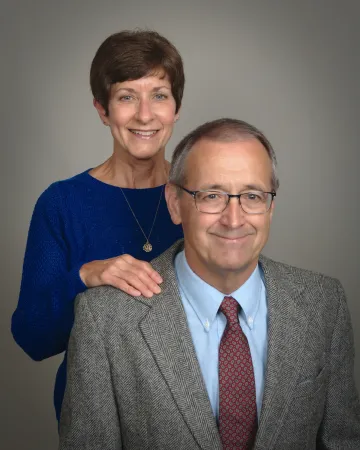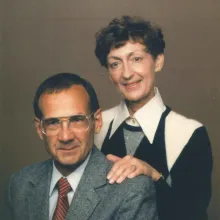
David and Brenda Perry (above) established the Perry Family Scholarship to honor David’s parents, Kenneth and Joanne Perry (below), and to express their gratitude for the many close friends, professors, and staff members they met at OSC.
Perry Family
Dr. David L. Perry received his Bachelor of Science degree in electrical engineering from the University of Missouri/Rolla in 1977. He continued his graduate studies at the University of Arizona’s Department of Electrical Engineering and the Optical Sciences Center (OSC), specializing his research in optical detection and remote sensing. Receiving a PhD in 1991, David’s career included 22 years at General Dynamics AIS in Dayton OH, achieving the role as Lead Research Physicist. He then worked for eight years as an electro-optical engineer for Leidos, Inc., also in Dayton, OH. In 2023, David became an adjunct professor with the Electrical and Computer Engineering Department’s Applied Sensing Lab at the University of Dayton.
Brenda K. Perry moved to Tucson from her home in the Greenville Ohio area in 1978. She soon gained employment at the University of Arizona where she was an administrative assistant at the College of Law and the University Medical Center prior to joining the OSC in 1982 in a similar role.
David and Brenda established the Perry Family Scholarship to express their unwavering desire to support students as they reach new heights of excellence with their academic and research ambitions, particularly those who exhibit an aptitude for optical remote sensing.
This scholarship also symbolizes their appreciation for the many close friends, professors, and staff members that they met at OSC. Most importantly, this scholarship is to honor David’s parents, Kenneth and Joanne Perry, who encouraged and supported David, as well as several generations of students, in their interest in the sciences.

Kenneth and Joanne Perry
Perry Family
Qualifications
This award is open to graduate students who are in good academic standing and successfully enrolled full-time with The University of Arizona James C. Wyant College of Optical Sciences (the “College”). Preference is for applicants who have research interests in remote sensing science and engineering. Applicable topic areas include (but not limited to): (1) optical signature prediction and measurement, including material studies, radiometry, atmospheric propagation effects, and detection; (2) sensor design, performance prediction, fabrication and testing including lab and field trials and ground truth activity; (3) sensor materials and subsystems including optical and electro-optical component specification and testing; and (4) exploitation software and algorithm development for ground, airborne, and space borne remote sensors.
Preference is also for students who have demonstrated financial need based on the FAFSA.
Recipients
Jaclyn John
